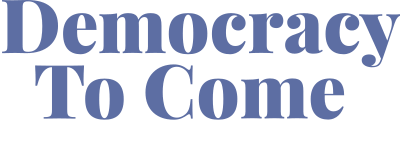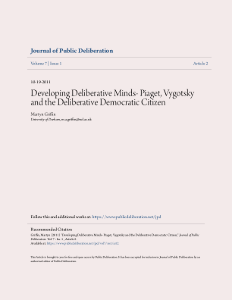The Piagetian account of development has been extremely influential in the deliberative democ- racy literature. It has been either explicitly or implicitly assumed by the majority of theorists working in this area. It encourages deliberative democrats to make at least four key assumptions about the development of deliberative citizens and their capacities. Firstly, that development is an organic process. Secondly, that it is a universal process. Thirdly, that it is an evolutionary or stage-centric process. And finally, that it is a process which is best encouraged through facilita- tive teaching methods. In this paper I will suggest that this Piagetian influence on deliberative democracy is not as positive as it is often assumed to be. It encourages a laissez faire attitude to development and does not properly explain how we can create deliberative citizens with a wide range of deliberative capacities. However, there is an alternative account of development which I believe offers a much stronger basis for the development of deliberative citizens. It was originally proposed by Piaget’s great rival, the Soviet developmental psychologist Lev Vygotsky. He pro- vides four corresponding ideas about development that could also be applied to the development of deliberative citizens. Firstly, development is primarily a cultural process. Secondly it is con- textual process. Thirdly, it is a revolutionary or crisis ridden process. And finally, it is a process which is best encouraged through direct and mediatory educational techniques. In this paper I will show how this alternative developmental perspective can provide a much stronger foundation for the cultivation of deliberative minds.
Developing Deliberative Minds- Piaget, Vygotsky and the Deliberative Democratic Citizen
Paper Title:
Developing Deliberative Minds- Piaget, Vygotsky and the Deliberative Democratic Citizen
Journal Title:
Journal of Public Deliberation
Published Date:
Authors:
Griffin
Abstract:



